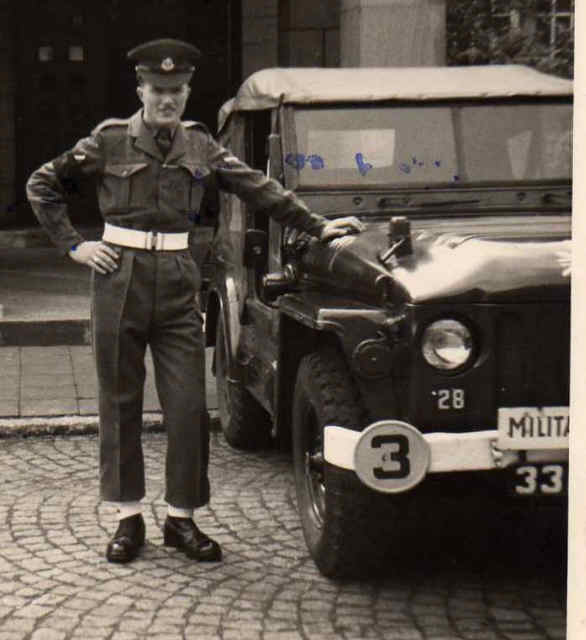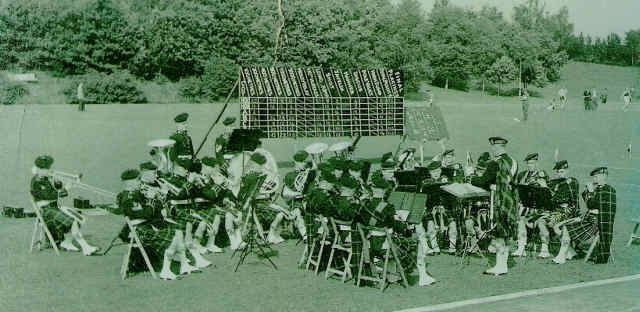
The first National Service Act came into force during World War 2, and was extended at the end of the war. The National Service Act of 1948 set the period of service as eighteen months with a further four years in the Reserve. In 1950 the Korean War led to the service being increased to two years with three and a half years in the Reserve.
National Service ceased on 31st December 1960, with the last man leaving nearly three and a half years later. Who was that man? This is subject to debate – see here and look at the third paragraph.
Like most young men of my generation, I had to register under the National Service Act at the tender age of seventeen and a half, expecting to be called up six months later. Well my eighteenth birthday came, and went, my nineteenth birthday the same, and by my twentieth I had not heard a thing, and at this time the government were going to do away with National Service. So, it was safe to assume that I had got away with it!
Then five months before my twenty first birthday I had to report for a medical just off Broad Street Birmingham. Despite my protestations about not being able to see the card on the wall let alone read the bottom line, I was pronounced “A1”.
I was then ushered into the presence of a man that I now know to be a Major in the Royal Tank Regiment. “What A fine looking man you are” he said, have you thought what you would like to be in the army?” “A civilian.” I replied. A look came over his face that seemed to say I wish I had a shilling for every time I heard that one. Give it some thought he said, what would you like to do if we can fit you in to your choice. Well at that time I was labouring in Cadbury’s chocolate factory, and a lot of Cadbury lads were taken into the Catering corps, and I thought a volunteer is worth ten pressed men, and if you are going to learn to cook learn to cook for many, a string to my bow as they say. So I said I wouldn’t mind going in the catering corps. WHAT? he said, the excused boots and the odds and sods, a chap like you would enjoy the RAC, I thought he meant the RASC, yes I said I wouldn’t mind learning to drive a lorry, not the bloody jam stealers he said, the RAC the Royal Armoured Corps, you get to wear the w*nking spanner! Cuts a bit of a flash with the girls you know. You learn to drive tanks and armoured cars. No I said I would not like that at all. Was your father in the services? yes I said, ah, good he said which part of the services did he serve, the Military Police I said, I wouldn’t mind joining them, Well that was worse than saying the Catering Corps. Look he said you get three choices, I will put you down for the RAC first choice, RMP second choice and Catering corps third choice.


Left – Bangor Barracks, Wuppertal – circa 1962. Right – a brief stop on the A2.
Two weeks later I was told to report to the Royal Artillery at Oswestry. After a week of square bashing it was selection time again, and they wanted volunteers for the RMP. Again it was three choices so RMP was first choice, King’s Troop second choice, and gun layer third choice,. Within forty eight hours I was on my way to Woking to train as a Redcap.
Malcolm Smith
I joined the Seaforths when I was 16 and served 8 years with them thrn served 17 years with the Irish Guards band. My first army posting was Spey Bks, Buxtehude. I was awestruck to be in a foreign land and hearing foreign languages. In time I settled down in the band and military life, calling certain people sir and others Corporal or Sergeant. The first time I sat down with the band I froze. I was used to my wee small band back home and here I was with a hugely higher standard and of course wearing a kilt. I had to learn to march, and keep in line, and of course play marches while on the march, and the hair cut, my god it wasn’t into the skull it was into the brain!
.jpg)
.jpg)
Left – The first week in Buxtehude. Right – Ready to depart Eygpt.
On both photographs the scribe can be seen on the right.
After my first year the band were booked to play in the Embankment Gardens London. By this time I had learned a great deal on playing marches and classic type music. I loved playing all the different scores of music. I was then sent to the Army School of Music called Kneller Hall. It was fantastic, the tuition was brilliant, the course lasted a year and I became a far better musician than I expected.
After the course I was sent back to the regiment which was now posted out to Egypt. This was once again awesome – the sand of course the mosquito nets, the terrific heat and later on we had to do guard, with a .303 rifle with a bayonet and live ammunition. I didn’t have to fire it. Later we got a spot of leave in Port Said and one day a few of us had a wee walk into the town and found a music shop. We asked the Arab chap if we could play the instruments, he said ‘ok you good men’, we played when the saints come marching in and in a few minutes we were mobbed with Arabs. The police had to ask us to stop as the crowd was getting bigger, the funny bit was the Arabs were throwing money to us.
Egypt was a good posting and later were posted to Gibraltar. On parade one day I felt ill and fainted. I had malaria so I was sent to hospital. It was dreadful when the bouts of malaria kicked in. After I got over it I came back to the band block. ‘Gib’ as we called was a great posting, plenty of shops, bars, cinemas and we could go over the border into Spain, and there were ladies by the ton as we used to say. Our time there finished and we returned to Münster, Germany.

Seaforths Band
By then we lost all of our good musicians so I decided to buy myself out of the army. I did and went back home. Getting back to civvy street seemed ok at first so I asked my fairly new wife if it was all right for us to go back to the Army. She thought about it and asked if I was going back to a band? I said I had the Irish Guards band in mind so that was it – we were set to live in London. I had passed the tests so all we had to do then was find accommodation: we got a flat in Crystal Palace and we settled down there.
The band was once again a stirring shock. The band was huge and the standard was out of this world. This third time the tunic was red with the famous bearskin. This was a far different from what I had been used to. There were over 70 musicians and boy did they play great, and I was in heaven. Doing Changing the Guard at the palace became a regular job. Trooping the Colour was a fantastic item. We often played on radio, cut a lot of records, played all over the country and played for quite a few big stars and the trips abroad were a dream come true. We were in a few films: Oh What a Lovely War; The Ipcress File; The Magic Christian; Workers Play Time; and Friday Night is Music Night.
The tours abroad were fantastic. In all my life as an army musician was a dream come true, I am so proud to have been a musician and played so often for our Royal Majesty.
William Buchanan
